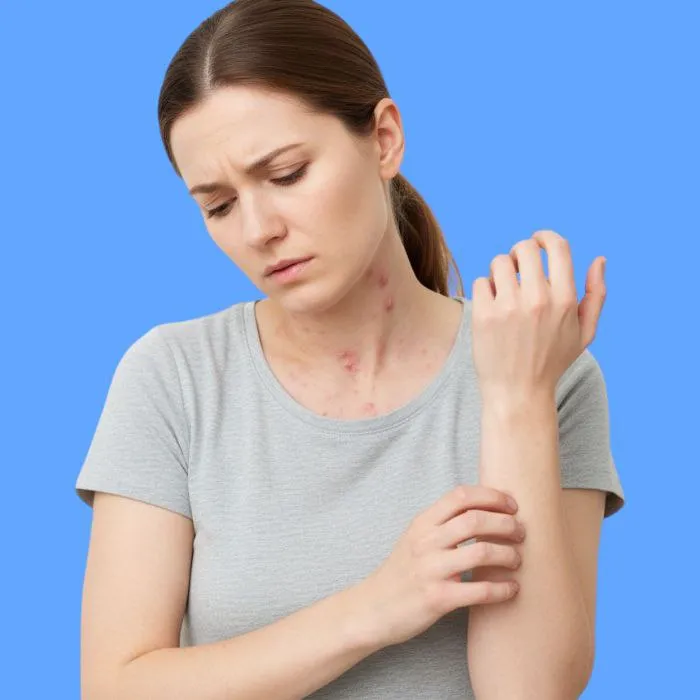What is urticaria?
Urticaria, or hives, is a common skin condition characterized by a red, itchy rash that causes temporary swelling.
Urticaria appears suddenly and disappears within hours or days. It can be acute or chronic, depending on its duration.
What causes urticaria?
Urticaria occurs as a result of the body's reaction to certain substances or internal conditions. Some of the most prominent causes include:
- Eating allergenic foods such as nuts or seafood.
- Using certain medications, such as antibiotics or painkillers.
- Insect bites or exposure to toxins.
- Stress and psychological pressure.
- Viral or bacterial infections.
- Sudden changes in weather or exposure to heat and cold.
What are the common symptoms of urticaria?
Urticaria appears on the skin with several noticeable signs, including:
- Raised red welts.
- Intense itching or burning.
- Sometimes swelling of the lips or eyelids.
- The rash has changed from small spots to large areas.
- The rash has disappeared and reappeared in different locations.
When should you see a doctor?
It is recommended to consult a doctor in the following cases:
- The rash persists for more than two weeks.
- Difficulty breathing or swallowing.
- Severe swelling of the face or tongue.
- Excessive itching that interferes with sleep or daily activities.
- Ineffectiveness of home remedies or simple medications.
How is urticaria diagnosed?
Urticaria is easily diagnosed through several medical steps, including:
- Clinical examination of the rash.
- Review of medical history and the pattern of symptom onset.
- Allergy testing to identify triggers.
- Blood tests to rule out autoimmune diseases or infections.
How is urticaria treated?
Several effective treatments are available for urticaria to relieve symptoms, including:
- Antihistamines to reduce itching and redness.
- Topical or oral corticosteroids in severe cases.
- Avoiding known allergens. Use cold compresses to soothe the skin.
- Keep the skin moisturized with gentle, fragrance-free products.
Can urticaria be cured?
- Urticaria can often be completely cured, especially in acute cases.
- Symptoms disappear within days with appropriate treatment.
- In chronic cases, regular follow-up may be needed to control symptoms.
- Avoiding triggers and maintaining a healthy lifestyle helps prevent recurrence.
What are some tips for preventing urticaria?

Urticaria can be prevented by following these guidelines:
- Avoid foods or medications that trigger allergies.
- Wear loose-fitting cotton clothing.
- Reduce stress and anxiety.
- Avoid extreme heat or cold.
- Moisturize the skin regularly.
What are the possible complications of urticaria?
Neglecting treatment can lead to some complications, such as:
- The condition becoming chronic.
- Swelling of the throat or face.
- Difficulty breathing in severe cases.
- Skin infections resulting from constant scratching.
- Sleep disturbances or chronic anxiety due to itching.
Frequently Asked Questions about Urticaria
Is urticaria contagious?
No, it is caused by an immune reaction, not an infection.
Does urticaria go away without treatment?
It may clear up spontaneously within hours or days.
Does stress worsen urticaria?
Yes, psychological stress is a contributing factor.
Is urticaria dangerous?
Rarely, unless accompanied by throat swelling or difficulty breathing.
Can urticaria recur after recovery?
Yes, if you are repeatedly exposed to the trigger.
Article Summary
Urticaria is not a serious illness, but it is bothersome and requires prompt attention to prevent its progression.
Identifying and avoiding triggers is key to prevention.
Consult a doctor if you experience frequent or severe rashes, and take care of your skin health and lifestyle to maintain your overall well-being.